| NHS now inviting those aged 44+ to have their vaccination People aged 44 are the latest age group to be invited to book their Covid-19 jab, from today. Around half a million 44-year olds will receive a text inviting them to get their jab through the national booking service. This comes alongside the latest figures that show that more than two thirds of people aged 45 to 49 have now received their first vaccination. The decision to move to people aged 40-43 will be set out in the coming days with the NHS vaccinating in line with JCVI advice and as supplies allow. As with previous age groups, those who prefer to wait to receive an invitation from their local GP service are able to do so. Surrey Heartlands vaccination programme – some numbers As at Sunday (18-Apr), Surrey Heartlands had delivered around 680,000 vaccines via local GP sites, Hospital Hubs, Community Pharmacies and the Vaccination Centre at Epsom Racecourse. Of these around 160,000 are second doses. Overall Surrey Heartlands continues to perform well and in many areas is exceeding the national average. For example, for people aged over 55 uptake of first doses exceeds 80% and is almost 100% for those aged 75-79. For second doses, the story shows a similar picture for most age groups. Second doses Second doses are routinely offered around 11 weeks from the first dose being given. A Local GP-led vaccination site will contact individuals by text or by telephone to arrange an appointment to receive a second dose. In exceptional cases some people will be invited earlier. Please don’t contact the CCG or your GP practice about your 2nd dose appointment unless you’ve not been contacted by the 11th week. Please be patient. If you do need to contact us, details are available on our website: www.surreyheartlandsccg.nhs.uk or via our vaccination enquiry line 0300 561 2500 (Monday-Friday 9.00 am – 4.00 pm). Those who booked via the National Booking System will have made their second appointment at the time of booking. Frequently asked questions (FAQs) |
| You can find a comprehensive set of FAQs on the local programme on our website here. |
| Useful links FAQs NHS.UK Covid-19 vaccine GOV.UK Covid-19 vaccination programme Data release Information on priority groups |
Tag Archives: Covid-19
Haslemere Vaccination Update
Vaccinations started this morning at St Christopher’s Church. All is running smoothly. I’m liaising with Surrey County Council and Waverley Borough Council to ensure there is sufficient parking for NHS staff and for those being vaccinated who need to park close to the church.
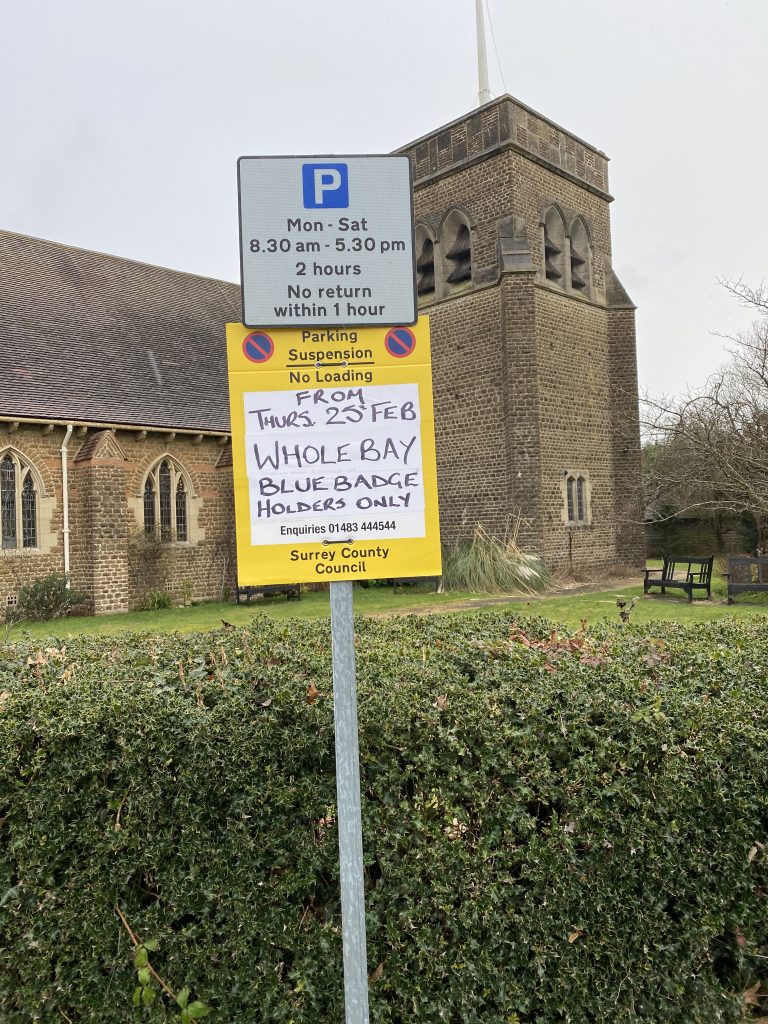
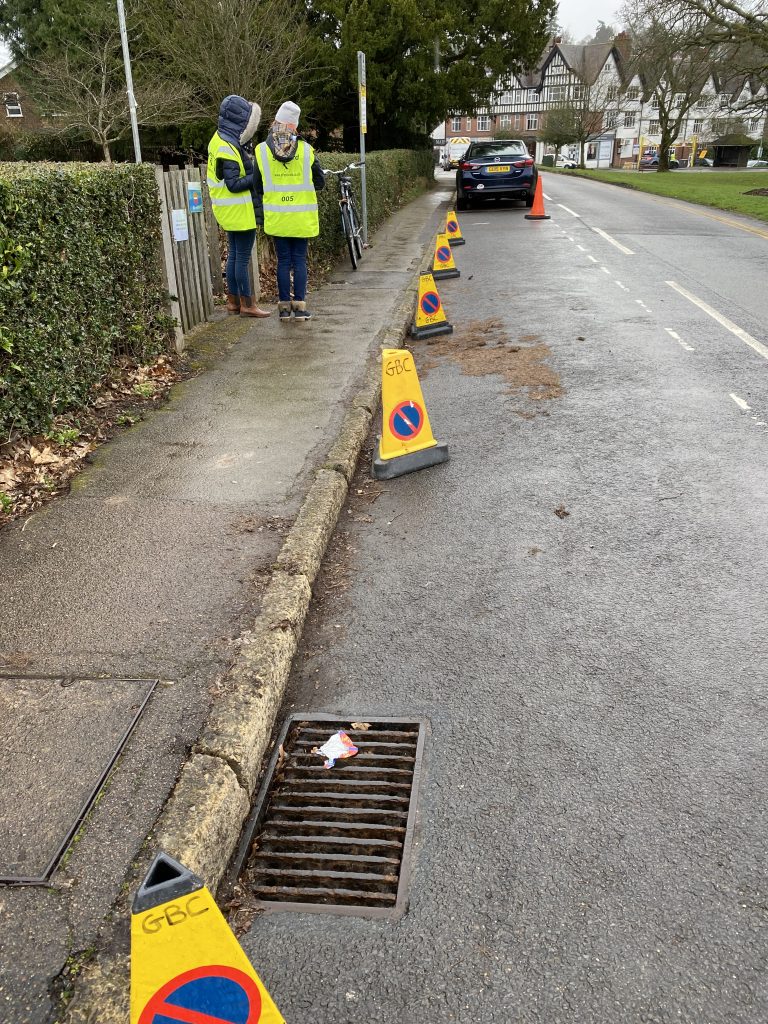
Dedicated parking for NHS staff has been set aside in the Wey Hill Fairground carpark. The car park is busy with workers from the nearby construction site so, more spaces will be found in Weydown Road/Fairground short stay if needed.
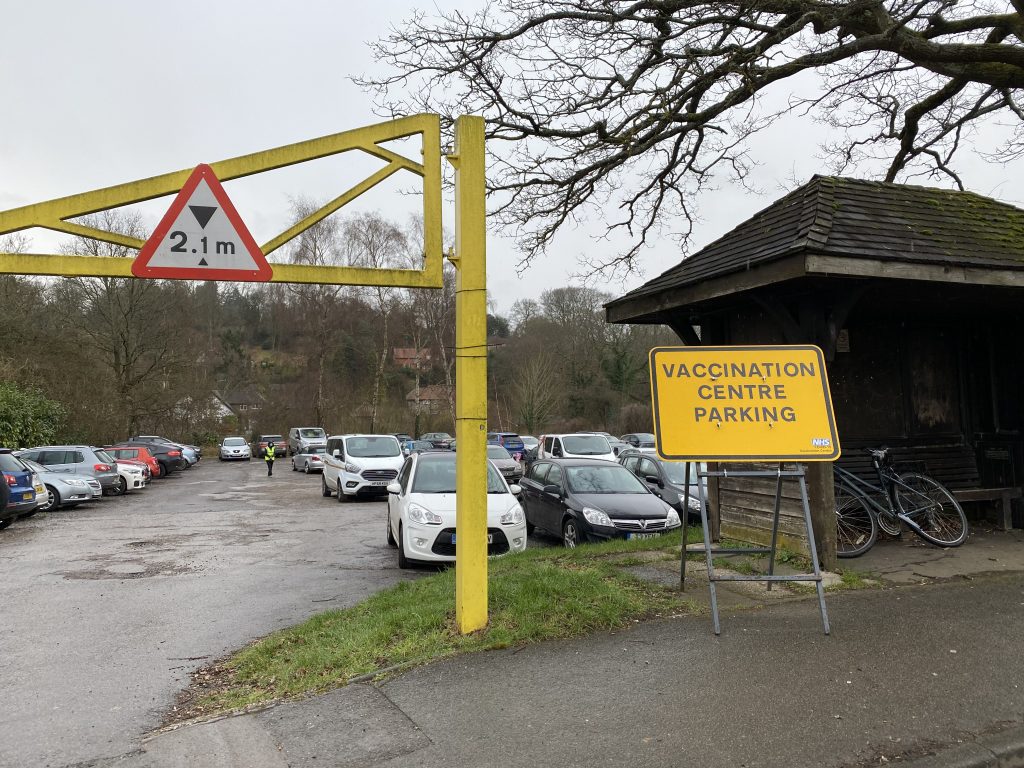
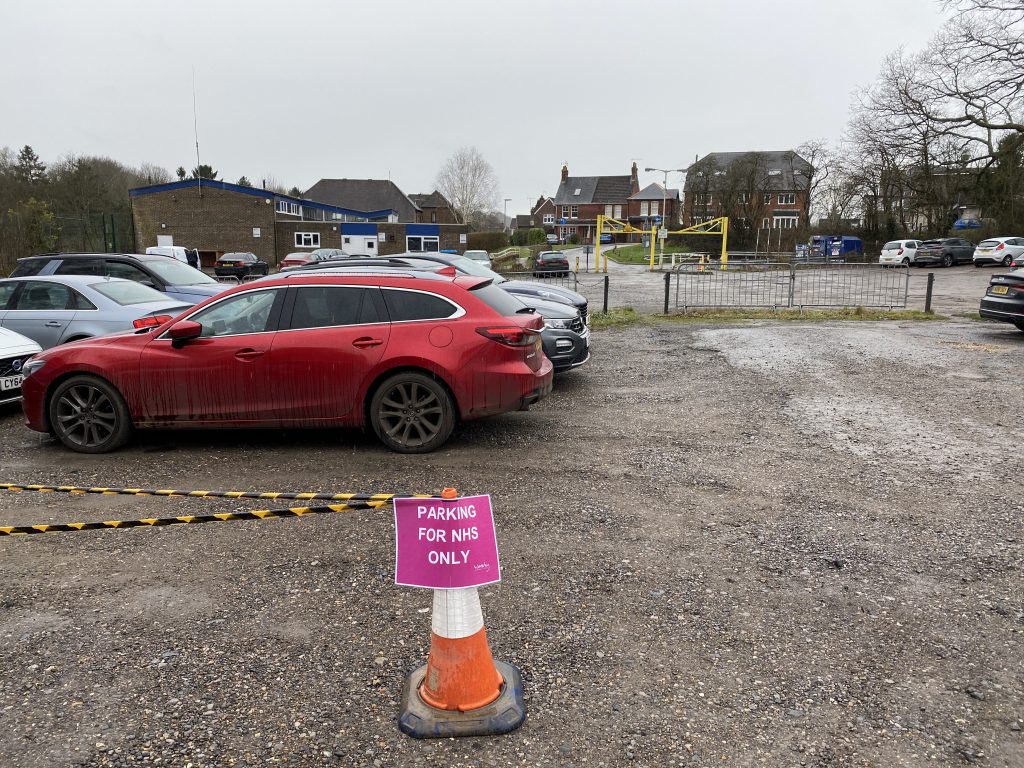
Please note, the Covid testing centre has been moved from Weydown Road car park to Godalming tomorrow, Fri Feb 26- Sat Feb 27th to make space.
I have agreed with the NHS team that from March 8th when schools re-open. vaccinations will start later-at 9.20am until 5pm- to reduce morning traffic congestion around St Christopher’s Green/Wey Hill as much as possible.
The plan is for 200 vaccines/day at St Christopher’s, with a rolling program of vaccinations 3 days/week to deliver 200,000 Covid vaccines to cohort 6 over the next few weeks.
Anyone that received first Pfizer jab in December will have their 2nd jab at GLive where the space and facilities are better suited to the Pfizer health requirements. St Christopher’s in Haslemere will only be giving AstraZeneca jabs.
Surrey Heartlands Covid-19 Vaccination Programme Partner Update
I received this update yesterday from Surrey Heartlands:

Bad weather update
Snow and flood warnings are in place for parts of Surrey this weekend (6/7 February). Our Covid-19 vaccination services are currently expected to run as normal but if this changes we’ll share any updates on our website here. In case of adverse weather, we would ask people to travel safely and if they can’t attend, please don’t worry, we’ll be in touch to reschedule. For those attending, we would like to remind you (just in case of any queuing although this will be kept to a minimum) to:
- Dress warmly
- Try to arrive on time but not early
- If you are coming by car and are early, please stay in your car until close to your appointment time
- Bring a warm drink in a flask
Latest data
The latest published data here shows we have now delivered a total of 148,294 first dose vaccinations across Surrey Heartlands (up to 31 January). Our latest infographic below shows more detail; the graphic is also available on our website here.
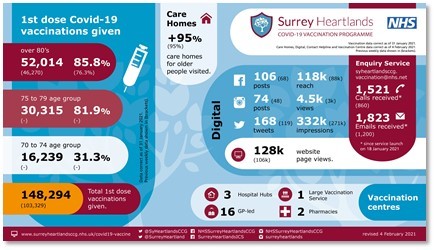
In conversation with Dr Sally Johnson
Dr Sally Johnson, GP and clinical lead for our vaccination programme, answers lots of common questions and myth busts in this latest video which you can watch here. (Subtitles can be activated by clicking on the CC button along the bottom row of the video).
Latest FAQs
You can find a comprehensive set of FAQs on the local programme on our website here. In the meantime, we will regularly publish the answers to some of the most common/latest questions here.
How are you choosing who to vaccinate when?
We are currently offering the COVID-19 vaccine to people in JCVI priority groups 1 to 4. We are hoping to complete these priority groups by the middle of February. These include:
- all those 80 years of age and over
- we are proactively contacting anyone who has not yet been vaccinated by telephoning and writing to them. We are reviewing all GP lists to ensure we have not missed anyone
- frontline health and social care workers
- all those 75 years of age and over
- all those 70 years of age and over and clinically extremely vulnerable individuals.
- People with the following conditions are automatically deemed clinically extremely vulnerable:
- solid organ transplant recipients
- people with specific cancers
- people with cancer who are undergoing active chemotherapy
- people with lung cancer who are undergoing radical radiotherapy
- people with cancers of the blood or bone marrow such as leukaemia, lymphoma or myeloma who are at any stage of treatment
- people having immunotherapy or other continuing antibody treatments for cancer
- people having other targeted cancer treatments that can affect the immune system, such as protein kinase inhibitors or PARP inhibitors
- people who have had bone marrow or stem cell transplants in the last 6 months or who are still taking immunosuppression drugs
- people with severe respiratory conditions including all cystic fibrosis, severe asthma and severe chronic obstructive pulmonary disease (COPD)
- people with rare diseases that significantly increase the risk of infections (such as severe combined immunodeficiency (SCID), homozygous sickle cell disease)
- people on immunosuppression therapies sufficient to significantly increase risk of infection
- problems with your spleen, for example splenectomy (having your spleen removed)
- adults with Down’s Syndrome
- adults on dialysis or with chronic kidney disease (stage 5)
- women who are pregnant with significant heart disease, congenital or acquired
- other people who have also been classed as clinically extremely vulnerable, based on clinical judgement and an assessment of their needs. GPs and hospital clinicians have been provided with guidance to support these decisions
- If someone considers themselves to be clinically extremely vulnerable but their clinical condition is not included in the list above, they are advised to contact their GP or specialist to discuss.
- People with the following conditions are automatically deemed clinically extremely vulnerable:
Useful links
Surrey Neighbourhood Watch – Warning of A Scam Regarding Covid Vaccination Bookings
Notification from Surrey neighbourhood Watch
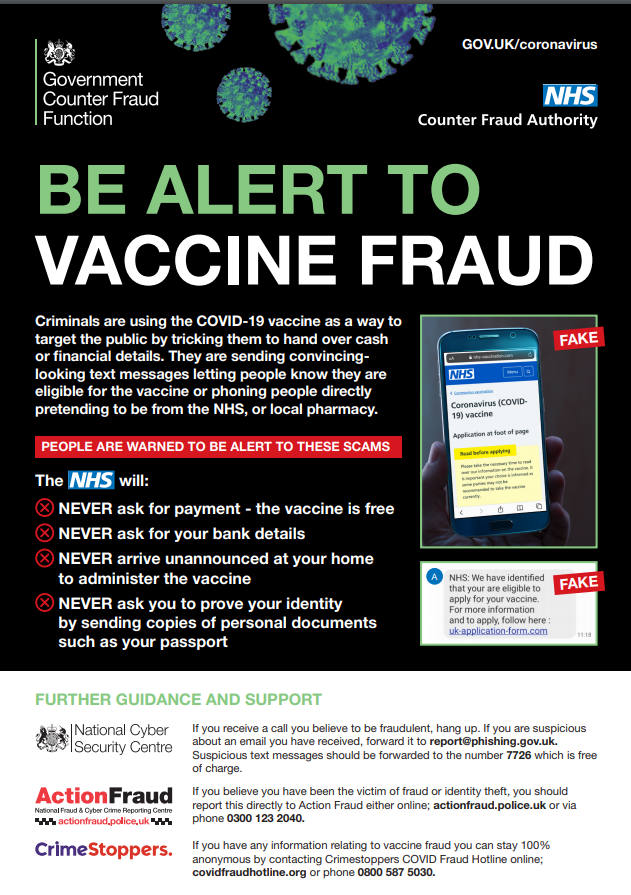
Dear Surrey resident
Covid vaccinations are being carried out across Surrey and some of you will have already been called for your first vaccination. For those waiting, please be aware that there is a scam whereby people are receiving texts that appear to be from the NHS and ask for personal and bank details to pay for the vaccination. These are scams.
The Covid vaccination is free and you will be contacted via a text (usually from your GP practice), a letter from the NHS, or possibly a phone call from your GP if short notice. All these methods will allow you to choose a venue and a time. You are not applying for the vaccination – you are being invited to attend one of the vaccination centres. At no time will you be asked for any other personal or financial details (but you may need to provide date of birth as a security measure).
The link below downloads a poster from the government giving details of what a scam invitation will look like.
Keep safe and well
Martin Stilwell
Surrey Neighbourhood Watch
Volunteers for Guildford & Waverley Covid-19 Vaccination Centres
Several people have asked about volunteering at vaccination centres. Here is a response that I have received:

If people want to register to volunteer for marshalling, etc., at the Guildford & Waverley Covid-19 Vaccination Centres, they can go to the Voluntary Action South West Surrey website and there will be a link generated when it’s active, but there is nothing available at the moment because the first month of shifts/roles has been filled. So, the advice is to keep checking! Once open again, the different roles can be accessed by going to our website (https://voluntaryactionsws.org.uk/), clicking on “View local volunteering opportunities” and scrolling down to ‘NHS Volunteers’ and clicking into it.
Advice from The Rotary Club of Haslemere regarding Vaccination
I am sharing this checklist produced by The Rotary Club Of Haslemere regarding the vaccination programme.
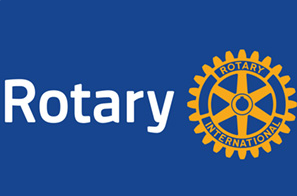
There is so much confusion about the vaccination process and far too many scams happening right now. Although there is no definite process in place we thought to share some important points to consider. They suggest this list which should be used as a guideline. Check https://www.gov.uk/coronavirus if in doubt.
1. Do not ring your GP, hospital or the NHS for an appointment. Everyone is on their database and should be offered an appointment, by post or phone, to go to a vaccination hub or their GP when their “number” comes up. If you would find it difficult to get to a vaccination Hub you may request that you have an appointment with your GP or somewhere more local.
2. Write your NHS number on a piece of paper and keep it by your phone. You could be asked for this when you respond to their initial contact. If you don’t know your NHS number it can be found on any documentation you will have received previously from your GP (e.g. prescription), hospital or the NHS.
3. When you visit for your appointment wear clothing which gives you easy access to the shoulder you prefer the injection to be in. This is to avoid queues forming e.g. whilst people struggle with multiple layers of tight fitting clothing.
4. Very few people have any adverse reaction to the injection, except for a small pin prick from the needle and maybe a slight warm feeling. You will be required to sit quietly for 15 minutes after the injection whilst the staff observe you to ensure there is no adverse reaction.
5. The whole procedure from check-in on arrival to departure after the 15 minute observation should take about 30 minutes, but be prepared for delays if people arrive unprepared.
6. If you have an adverse reaction when you get home it is probably best to phone 111 letting them know what you have just experienced following a recent vaccination.
7. Only phone your GP Surgery about a Covid vaccination if you hear via the media/press that your age group has been fully vaccinated, but you haven’t.
8. More detailed information will be given to you during your appointment.
Surrey Council Core Brief
Core Brief 05/01/21

SURREY DATA:
The R rate for South East is 1.2-1.4 as of the latest update from gov.uk (23rd December). It’s normally updated every Friday but they seemed to have paused over the Christmas break.
Overall, the 7-day rate in Surrey has gone up 23% from 18-24 December (545.1) to 25-31 December (670.8). This will still be affected by holiday reporting, so is likely to go further in the coming 7 days.
Please note the different time period for the positivity data.
*Positivity – weekly percentage of individuals that test positive.
|
7-Day Rate 27 Dec – 02 Jan |
7-Day Cases 27 Dec – 02 Jan |
7-Day Positivity* 24 Dec – 30 Dec | |
| England | 550.0 | 309,591 | |
| South East | 632.7 | 58,080 | 18.9 |
| Surrey | 673.7 | 8,059 | 19.3 |
| Spelthorne | 854.3 | 853 | 23.8 |
| Surrey Heath | 751.4 | 671 | 20.7 |
| Epsom and Ewell | 740.4 | 597 | 20.2 |
| Reigate and Banstead | 730.8 | 1,087 | 17.9 |
| Elmbridge | 715.7 | 979 | 19.1 |
| Woking | 712.4 | 718 | 21.3 |
| Tandridge | 709.2 | 625 | 19.3 |
| Waverley | 623.0 | 787 | 17.5 |
| Runnymede | 607.2 | 543 | 18.6 |
| Guildford | 522.2 | 778 | 18.7 |
| Mole Valley | 482.5 | 421 | 15.6 |
NATIONAL COVID HOSPITAL ADMISSIONS – PROVIDED BY CABINET OFFICE:
| Date | National Covid-19 hospital admissions |
| 1st September 2020 | 496 |
| 1st November 2020 | 9,623 |
| Christmas day 2020 | 17,701 |
| 4th January 2021 | 26,626 |
Key messages:
- The Government has taken the decision to legislate new national lockdown restrictions because of a number of indicators, including the infection rate in the over 60s, the rate at which positive cases are rising and pressures on the NHS.
- There has been a stark rise in national Covid hospital admissions (see above) and now is the time to take action to prevent our crucial frontline services being stretched even further.
- Rates are now very high across the board in Surrey. There has been an alarming increase in rates across all age groups, this is particularly serious for the over 60s who are known to be more vulnerable to the virus.
- We are also able to share for the first time the positivity rates, which is the percentage of tests that are positive in each district and borough. This has increased rapidly in Surrey in recent days. Spelthorne currently has the highest positivity in Surrey – almost one in four tests carried out there are positive. Other districts and boroughs are not far behind. This is a strong indicator that there is real cause for concern.
- While this lockdown is not entirely unexpected news, it has a huge impact on all our lives and it is not the start to 2021 that we had hoped for. However, it is clear from public health data and the pressure across our National Health Service that these measures are absolutely necessary in order to save lives.
- I want to reassure everybody in Surrey that the County Council will continue to do everything we possibly can to guide our residents and businesses through this latest stage in our response to COVID-19.
- Together with our partners of the Local Resilience Forum, we have worked tirelessly to protect residents and equip our frontline services.
- We will step up support to the most vulnerable, frontline services, and work with our education providers over the coming days, and continue to communicate openly with residents.
- If people don’t follow the rules now, we are going to see rates rising even higher and the dangerous knock-on effect of that in our hospitals, stretching the NHS and frontline services even further and ultimately more deaths.
- Despite Tier 4 restrictions in place over Christmas our rates were still going up. The majority of people are doing the right thing and following the rules, but we have to think about the places where people are still mixing with others and make sure we are being extra vigilant.
- Make sure you are following the correct guidelines on support bubbles (you can only form one support bubble, with one other household – further guidance below). If you are mixing with others outdoors, only meet with one other person, by yourself, if they are not in your support bubble or don’t live in your house. Remember hands, face, space and continue to socially distance in shops and supermarkets. Even if you are wearing face coverings it is important to keep your distance from people not in your household or support bubble.
- There is hope for the future – the vaccine gives us that clear hope that there is a way out – but the vaccination programme will take time, so we have some exceptionally tough months to get through first.
- I want to reassure everybody in Surrey that the County Council will continue to do everything we possibly can to guide our residents and businesses through this latest stage in our response to COVID-19.
- We have been at the forefront of the response here since the first UK transmitted case was reported in Surrey in February last year.
What about the effect on Businesses?
- This has been an incredibly difficult time for all businesses that will now have to close again. It is hugely frustrating after all the work that has gone into adapting to COVID guidance during the previous months.
- I am pleased that support is available again from government but there is no getting away from the fact that this will be very tough for businesses. Unfortunately there is a clear public health need and we simply must take measures to stop the spread.
LOCKDOWN RULES – HOW DO THEY DIFFER TO TIER 4?
[Refer detailed questions to guidance on the .gov.uk Covid web pages]
LEAVING HOME:
You must not leave, or be outside of your home except where necessary. You may leave the home to:
- shop for basic necessities, for you or a vulnerable person
- go to work, or provide voluntary or charitable services, if you cannot reasonably do so from home
- exercise with your household (or support bubble) or one other person, this should be limited to once per day, and you should not travel outside your local area.
- meet your support bubble or childcare bubble where necessary, but only if you are legally permitted to form one
- seek medical assistance or avoid injury, illness or risk of harm (including domestic abuse)
- attend education or childcare – for those eligible
Colleges, primary and secondary schools will remain open only for vulnerable children and the children of critical workers. All other children will learn remotely until February half term. Early Years settings remain open.
Higher Education provision will remain online until mid-February for all except future critical worker courses.
If you do leave home for a permitted reason, you should always stay local in the village, town, or part of the city where you live. You may leave your local area for a legally permitted reason, such as for work.
If you are clinically extremely vulnerable you should only go out for medical appointments, exercise or if it is essential. You should not attend work.
MEETING OTHERS:
- You cannot leave your home to meet socially with anyone you do not live with or are not in a support bubble with (if you are legally permitted to form one).
- You may exercise on your own, with one other person, or with your household or support bubble.
- You should not meet other people you do not live with, or have formed a support bubble with, unless for a permitted reason.
Stay
2 m apart from anyone not in your household.
VACCINATION MESSAGES – Surrey Heartlands:
When and where is the Oxford vaccine roll-out starting locally?
As part of the national roll-out, we will start to receive small quantities of supplies of the Oxford vaccine later this week; supplies will ramp up over the coming weeks and we will gradually roll it out across our sites.
Supplies will be small to start with and we will gradually roll it out across our sites over the coming weeks – the whole vaccination programme is dependent on the supplies of the vaccine.
The new vaccine will be easier to store and transport and will enable us to ramp up roving services to care homes, the housebound and so on
If asked we could add:
- We expect Epsom Racecourse to go live as larger vaccination centre from next week
- Additional local GP-led vaccination services are going live across the county over next couple of weeks
How is the rollout going?
Across Surrey Heartlands we have been working hard over just three short weeks to deliver the Pfizer vaccine, through our first hospital hub at Royal Surrey, in GP-led community vaccination sites and we’ve just started a roving model to start vaccinating in care homes
NHS staff are doing an incredible job to deliver what it is the largest vaccination programme in our history, at the same time as continuing to be there for everyone who needs care.
This whole programme has been set up really quickly, starting with the over 80s and care home residents & staff as priorities; I would like to reassure any of your listeners that if you are within these groups and haven’t heard directly from us yet, we will get to you soon. Please help us by not contacting us directly, we will contact you as soon as we can.
The collaboration with local partners has also been incredible and has allowed us to roll this out at pace.
Important to include if you can:
The large increase in cases hospitals are seeing and the emergence of a new variant of the virus also shows that we cannot let our guard down now and even those who have received a vaccine still need to follow social distancing guidance.
The public have an important part to play to help us do this:
- please don’t contact the NHS to seek a vaccine, we will contact you;
- when we do contact you, please attend your booked appointments;
- and really importantly, please continue to follow all the guidance to control the virus and save lives.
This is the biggest vaccination programme the NHS has ever undertaken. It is a huge challenge, and not everything will always go perfectly.
The NHS is well-used to delivering millions of vaccines a year and is moving quickly to roll out this vaccine to those who need it, but it’s important that we remember this will be a marathon, not a sprint.
On pressure on the NHS, and potential of new lockdown measure:
As long as cases continue to rise there will be pressure on the NHS.
Locally whilst our health system, including our hospitals, is under considerable pressure we are holding our own – however the next few weeks are expected to be particularly difficult as we await any direct impact from the Christmas and New Year period on hospital admissions.
I cannot stress enough how important it is for people to follow the guidance and stay at home wherever possible.
SURREY HEARTLANDS – INCREASING CAPACITY OF NHS SERVICES
Due to the impact of Covid-19 on local NHS services, we are doing all we can as system, to increase capacity. This includes opening more beds and redeploying staff to support our Covid-19 response. As cases of Covid-19 continue to rise we have been working collaboratively as a system to put measures in place that will enable us to prioritise how we provide care to those who are most critically ill.
This is not a decision we have taken lightly but we must focus our efforts on those who need the most urgent and life-saving care. This means we have now postponed many routine and non-urgent elective procedures and operations across our system so we can focus on urgent and cancer care, including caring for those with Covid-19.
These new measures include:
· Opening up additional beds within our acute and community hospitals to help create additional capacity for people who need to be admitted. This includes plans to open additional beds at the NHS Seacole Centre.
· Prioritising urgent and cancer care over non-urgent care. This has meant postponing some routine planned elective procedures and non-urgent operations to help create additional bed capacity and free up staff who can then be deployed to support our Covid-19 response.
· Moving to virtual (telephone and online) appointments for many outpatient services to reduce the number of people travelling to hospitals and other sites to reduce transmission of the virus.
· Working together as a system, across health and social care, to discharge people from hospitals as soon as they are well enough to leave, with the right support and the right package of care.
· Working with our independent sector partners (such as private hospitals) to identify any additional bed capacity and any clinical staff that could be deployed to other sites if needed.
· Temporarily suspending home birth services due to ongoing pressures on the ambulance service which means SECAMB are unable to guarantee a timely ambulance response to those women choosing to plan their birth at home or in a stand-alone midwifery unit should they experience an emergency.
Importantly, patients who have appointments should still attend; if we need to reschedule an appointment patients will be contacted directly. Importantly, primary care services remain open.
For those who need urgent care which can’t be managed via a GP appointment, we would urge people to contact NHS 111 first, either online via www.nhs.uk or by calling 111; please keep A&E for emergencies only.
The measures we have put in place will allow us to care for those who need the most urgent help over the next few weeks; we will of course keep the situation under constant review so we can restore these non-urgent services as soon as possible. In the meantime, NHS services are available for those who really need help; spotting problems early is vital, especially cancers, and GPs continue to refer patients who need urgent treatment to hospitals as normal.
Further guidance
SUPPORT BUBBLE RULES – people must follow exact rules:
It is important that people understand the rules for support bubbles.
Not everybody can form a support bubble. You can form a support bubble with another household of any size if:
- you live by yourself – even if carers visit you to provide support
- you are the only adult in your household who does not need continuous care as a result of a disability
- your household includes a child who is under the age of one or was under that age on 2 December 2020
- your household includes a child with a disability who requires continuous care and is under the age of 5, or was under that age on 2 December 2020
- you are aged 16 or 17 living with others of the same age and without any adults
- you are a single adult living with one or more children who are under the age of 18 or were under that age on 12 June 2020
You should not form a support bubble with a household that is part of another support bubble.
If you share custody of a child with someone you do not live with, the child can move freely between both parents’ households. You do not need to form a support bubble to do this.
You can form a support bubble if you are eligible.
SCHOOLS
Colleges, primary (reception onwards) and secondary schools will remain open for vulnerable children and the children of critical workers. All other children will learn remotely until February half term.
In the circumstances, the Government does not think it is possible for all exams in the summer to go ahead as planned. DfE will accordingly be working with Ofqual to consult rapidly to put in place alternative arrangements that will allow students to progress fairly.
- Mass secondary school testing will still go ahead for staff and those pupils (critical worker parents or vulnerable) in school
- If one parent is a critical worker children will be eligible to attend school
- Head teachers will have the flexibility to allow children who struggle to access learning remotely to attend school
Covid-19 community vaccination programme for Surrey
Dear Stakeholder,
Covid-19 community vaccination programme for Surrey Surrey Heartlands CCG have been receiving lots of enquiries from the public regarding the Covid-19 vaccination programme in Surrey.
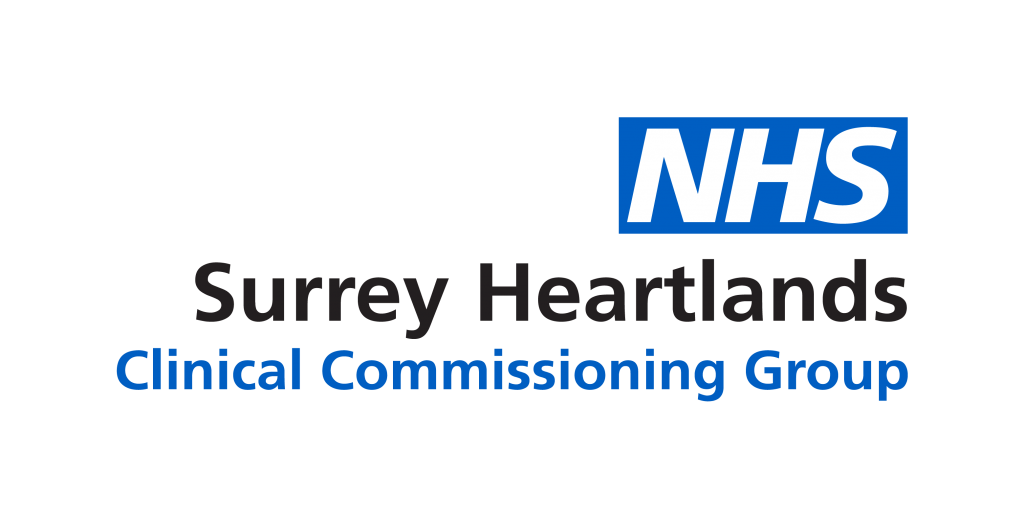
The Frequently Asked Questions are being updated regularly and can be found here. Please share these FAQs with your network.
Please encourage local people not to contact the NHS to seek a Covid-19 vaccine appointment, and reassure them they will be contacted when an appointment is available. We would ask you to encourage local people to help the NHS by being patient.
When people are contacted, they are urged to attend their booked appointment. Please also remind people that both doses of the vaccine are needed for it to be effective (which is about 7 days after the second dose).
Your help with sharing these key messages is much appreciated.
Finally, we would remind everyone to please continue to follow all the latest guidance to control the virus and save lives.
Thank you for your continued support.
